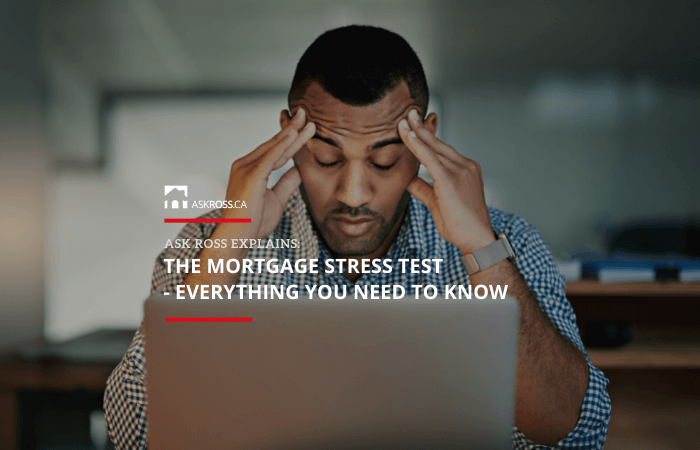
Much has changed since this article was first published back in 2018. The mortgage stress test is not a foreign concept to homeowners and homebuyers now.
But it HAS CHANGED a lot in recent years so I thought I would summarize a few important points for you about the stress test as it is today, January 27, 2023.
We care about the stress test rate because it determines your borrowing power. The higher the stress test, the less money you can borrow.
* Homebuyers with less than 20% down are mostly choosing a five year fixed rate mortgage with rates around 4.48%. Their stress test rate is 6.48%. (which is 2% higher than their contract rate)
* Homebuyers with at least 20% down who choose a five year fixed rate mortgage are seeing higher rates, around 4.99%. Their stress test rate is 6.99%. (which is 2% higher than their contract rate)
* If you choose a variable rate mortgage with a rate of say Prime less 0.5%, your stress test rate would be 8.2% (given Prime today is now 6.70%).
If you cannot stand these stress test numbers being so high, we can always look at mortgage offerings from a couple of big, reputable credit unions. These are also A-lenders who are provincially, not federally regulated.
Credit Unions do not have to add 2% to their contract rate if they don’t want to (assuming there is at least 20% equity in the mortgage being requested)
In that case, we might be able to use a contract rate as low as 6.19% which would also be the stress test rate.
Please note, the Mortgage Qualifying Rate (MQR) of 5.25% is still “out there” but it is totally irrelevant in the current rate environment.
One thing is clear, it’s quite confusing for the average Canadian. In our Toronto, Mississauga and Richmond Hill offices, we deal with this stuff dozens of times every week; and you might only have to think about it every few years. So do yourselves a service and ask us to help guide you through your options.
Original 2018 Stress Test Article
Many homebuyers ask me how the new mortgage stress test rules affect them. Is the mortgage stress test just for purchasing a home? Do you have to pass the stress test for a refinance, or at mortgage renewal time?
Mortgage Stress Test Rules Apply to All Canadians in All Situations
The old mortgage rules don’t matter. All Canadians must now qualify using the mortgage stress test, so there are no ‘old rules’ or ‘new rules’, only the current rules for Canadian mortgage qualification, which include a stress test, and have been in effect since January 1, 2018.
Table of contents
- Mortgage lenders assess all borrowers the same way they always have!
- What is a mortgage stress test?
- The Not-So-Stressful Result
- Who Does The Stress Test Affect?
- With current mortgage rates, all major banks are stress testing above the MQR for all types of mortgages
- OSFI and the Stress Test
- What happens if you fail the stress test?

Mortgage lenders assess all borrowers the same way they always have!
The mortgage stress test doesn’t change what lenders care about — your income, employment, credit history, overall financial picture, and the property itself.
When lenders determine how much mortgage you qualify for, they want no more than 39% of your gross household income to go towards your monthly mortgage payment, property taxes, heating costs and maintenance fees, if any. This is called your gross debt service ratio. (GDS) Think of this as your monthly housing costs.
Then they also factor in other monthly obligations like car payments, student loans, credit cards, other mortgages, etc., and they want no more than 44% of your gross income to go towards everything. This is called your total debt service ratio. (TDS) This is your monthly housing costs plus all other debt and financial obligations.
This has not changed.
So why is everyone so stressed out about these changes?
First, let’s circle back with a quick refresher on the test.
What is a mortgage stress test?
In days gone by, the lenders calculated your debt service ratios based on the actual mortgage contract rate, and determined if you were strong enough to qualify.
The stress test adds a little something on top. It is a calculation done by the lenders to ensure you can handle increased payments when your mortgage matures. They do this most of the time by qualifying you at 2% more than your actual contracted mortgage rate.
The government is concerned with rising interest rates, and they want to ensure you qualify for your mortgage today and in the future if mortgage rates have risen a couple of percentage points by the time you renew.
So now CMHC and the other mortgage insurers ratchet up your mortgage rate by 2% in the application process, and they calculate the numbers again. The ratios in the stress test calculator this time are used to determine how much mortgage amount you qualify for today. THAT is what the stress test consists of. You need to pass the mortgage stress test in order to qualify for your mortgage.
Here are the mortgage stress test rules:
To be precise, they run the numbers at the GREATER OF:
2% more than your mortgage contract rate OR the Bank Of Canada Qualifying Rate (MQR).
In July 2022, this minimum qualifying rate (MQR) is 5.25%.
The Not-So-Stressful Result
Plain and simple, the stress test is intended to protect us from overextending ourselves. To avoid borrowing to the absolute max — with no wiggle room.
So the intention here is to give us a buffer. Whether we want one or not.

Who Does The Stress Test Affect?
Most mortgage lenders use the stress test in all lending situations. There are some exceptions such as:
*private lenders
*speciality mortgage products from mainstream lenders (high Net Worth programs for example)
*Credit Unions
Some credit unions use a DIFFERENT, lower stress test, where you only have to qualify at the contract rate or the contract rate plus 1%. This would only be for mortgage applications which are NOT hi ratio purchases. They can do this because they are provincially regulated.
Whether you are buying, refinancing or switching to a new lender at mortgage renewal time, the stress test is now a way of life. We need to accept this new normal of borrowing.
Since the market has become quite fragmented, asking the question “what’s your best interest rate” is almost pointless — because there are several, depending on the borrower you are and your personal circumstances.
Instead, you need to understand your options and limits—especially BEFORE making a significant decision.
In other words, proceed with thought and foresight. An experienced and capable mortgage agent should be able to explain all your options. If you don’t feel you have one in your corner, do some online research and find yourself someone with some klout.
With current mortgage rates, all major banks are stress testing above the MQR for all types of mortgages
Rate increases are likely going to continue into 2023. Looking back at 2021, we brokered some mortgages at 1.59%. The five-year rate has already more than tripled since then!
These new higher rates mean the mortgage stress test is itself under siege. Instead of qualifying at your actual mortgage rate, or even at the MQR rate of 5.25%, you will be tested at 2% higher than your actual contract rate.
How does the stress test affect housing affordability as rates rise?
Rising interest rates are going to create a housing/mortgage affordability problem :
The monthly payments on a 5.34% mortgage are significantly higher than they are at 2%. Canadians can only afford so much of their monthly income to put towards their mortgage payments. Meaning their debt service ratios are shrinking. If the purchase price doesn’t start dropping, potential buyers will not qualify for a large enough mortgage to afford anything.
When determining how much borrowing power or the mortgage amount you qualify for, the mortgage stress test kicks in.
That means your mortgage qualification is determined by calculating your debt service ratios at 2% higher than the actual mortgage contract rate, or the government mortgage qualifying rate of 5.25%, whichever is greater.
That means the stress test rate will be at 7.34% (not 5.25%) when your fixed-rate mortgage offer is 5.34%.
How can I avoid the mortgage stress test?
Credit Unions – may qualify you at the actual contract rate or contract rate plus 1%
You cannot completely avoid the mortgage stress test, but you might be able to position yourself with a lender whose stress test thresholds are lower than the norm.
For example, Credit Unions are provincially regulated and can offer creative financing alternatives. The ability to qualify at the contract rate can increase your borrowing power in a significant way.
B-lenders – qualify you with expanded debt service ratios – as much as 50%/50% and even more if your loan to value ratio is less than 65%.
You have access to more money if you are assessed at a rate of 50/50 versus the norm of 39/44.
However, by mid 2022, the advantage of the B-lenders has largely been wiped out though because their stress test is simply too high. Their mortgage rates are starting in the high-five percent range. This means their stress test rate is pushing 8% !!
Variable Rate Mortgages – the stress test for these is now the contracted rate plus 2%
Variable rates are still low – that will change as we expect more prime rate increases in the months ahead. Till mid July, 2022, most were qualifying at 5.25%. This is no longer the case.
On July 13, 2022 the MQR was rendered useless because the Prime Rate increased to 4.70%. Which means even the best variable rate mortgages will stress test at their contracted rate PLUS 2% – which is now always bigger than 5.25%.
So with the Prime Rate today at 4.7%, even these mortgages are seeing an increase in their stress test rate.
Today a conventional VRM might be at Prime less 0.3%. So today their stress test rate is 6.40%.
Today a hi-ratio VRM might be at Prime less 0.75%. So today their stress test rate is 5.95%.
Even though all mortgage rates are increasing at a crazy pace, more consumers than ever are being forced to choose a variable rate mortgage whether they want one or not because the stress test is much lower. It makes a huge difference.
If you go this route and you really cannot stand the idea of being in a variable-rate mortgage, then you can always ask your lender about your options to convert to a fixed-rate mortgage as soon as the VRM is funded. It will be a seamless switch at that time.

OSFI and the Stress Test
The Office of the Superintendent of Financial Institutions (OSFI) is Canada’s main financial services regulator. OSFI created the stress test in 2016 to ensure Canadians would not overextend themselves in the event interest rates rise. This is a national policy that does not change from province to province.
There is an annual announcement regarding the stress test every December to discuss any changes. As of June 2022, there is the potential that the stress test could be altered if current conditions don’t change. These decisions can create an increase, or decrease in the current stress test level.
What is the current mortgage stress test rate?
In today’s market, all 5-year fixed and variable rate mortgages fit in the qualifying rate plus 2% basket. The only exceptions are private mortgages and some offerings from credit unions.
With this extremely harsh qualifying rate and the housing market + housing prices are still higher than pre-pandemic levels, more and more potential homeowners are forced into qualifying for a variable rate mortgage or being pushed out of the real estate market entirely.
There is a discrepancy between mortgage rates and home prices right now that may get worse as we watch rates rise.
The stress test was designed to protect buyers from rising rates, but the forecast we see for the next two years might put current borrowers out of their buffer zone when their mortgage matures. This will leave OSFI and CMHC with some decisions to make regarding the future of the stress test.
Katherine’s Story: The Bank’s Stress Test Rate Was Too High
While the mortgage stress test was designed to help ensure Canadians don’t overstep their financial means, there are instances where it makes sense to bypass this process yet still keep affordability top of mind.
While you won’t necessarily have to adhere to a stress test when renewing a mortgage with your current lender, it still makes sense to weigh your options to ensure you match the mortgage product and rate that best meets your unique needs. Unfortunately, some lenders will never entertain a unique solution based on a specific borrower request.
What happens if you fail the stress test?
A case in point is a scenario involving my client, Katherine, who’s a homeowner in Durham Region, Ontario; her home is worth $725,000. Her mother co-signed for the initial mortgage years back. However, for estate planning reasons, mom’s name needed to come off the title, leaving the property solely in Katherine’s name.
Katherine reached out to the bank where she holds her mortgage to set the title change in motion. But what she received in return was a hard NO. With an annual income of $50,000, the bank wouldn’t even consider the thought of Katherine being able to service a $300,000 mortgage loan on her own, regardless of her story.
If you need non-traditional income sources like child tax benefits to pass the mortgage stress test, consider a mortgage broker if your bank is not prepared to include these in their calculations.
A broker can often get a ‘YES’ when everyone else says ‘NO’.
A single mother of two, Katherine receives no child support. But, she does get child tax benefits totalling $940 per month – $11,280 annually. That provides quite a boost to Katherine’s income when used to qualify for the mortgage, bringing a $50,000 salary above $61,000.
But, even then, Katherine’s bank said this still wouldn’t help her approval.

Different Lenders Often Have Different Guidelines
As mortgage brokers, we have access to a wide variety of lenders – including banks, trust companies and credit unions, as well as alternative and private funders – several of whom WILL consider child tax benefit as part of the income supporting the application.
Today, more lenders ARE accepting child tax benefits as a source of income for mortgage qualification purposes.
The mortgage stress test, however, still poses an issue with some of these lenders.
At Ross Taylor Mortgages, our job is to stay on top of product offerings from various specialty lenders. We knew of a specific credit union that would be perfect for Katherine, as their stress test criteria were lower AND they would accept the child tax benefits as a source of additional income.
Katherine was offered a five-year fixed-rate mortgage, with no lender or brokerage fees. We matched Katherine’s circumstances to the best lender from the dozens we have access to.
A decline is not the end of your story.
You still have options if you’re turned down when looking for a new mortgage or while refinancing or renewing an existing one.
If you’re working with a professional who has access to multiple product lines available through a large pool of lenders, there will always be a solution available to fit your needs.

 Apply For a Mortgage
Apply For a Mortgage